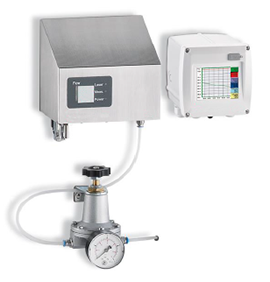SeasyParticle 230 Laser Particle Counter

Our particle counters are highly sensitive optoelectronic devices which require a special and careful
handling. Therefore please read through the following annotations and advices carefully. This will help
you to save unnecessary problems and costs.
.
Measuring media:
Suitable measuring media are: Air and all other non-explosive, non-corrosive, non-aggressive gases
whose temperature should not exceed 40 °C, as far as the maximum particle concentration (please
see technical data) is not exceeded (in case of doubt please use a dilution factor!!!).
Sensor system:
In case of a nonuse of the device the suction nozzle should be closed by means of a zero filter (HEPA
CAP) or a closing cap in order to avoid a soiling of the sensor system. This especially applies to the
transport and the storage of the instrument.
Please observe the following when putting the device into operation again:
The pump should only be switched on when the closing cap has been removed since this may lead to
damages at the pump. Furthermore, the instrument should not be exposed to any mechanical shock
since this may lead to a misalignment of the optics.
.
Location:
The instrument should be installed at a vibration-free location with a sufficient heat release, extreme
climate conditions (heat, moisture) should be avoided.
General matters:
The instrument should only be opened by authorized, skilled service staff since otherwise any
warranty expires.
Introduction
The particle counter SeasyParticle 230 is used for determination of the particle concentration in
gaseous carrier media. It is equipped with a laser diode as a light source. The particle detection is
effected sidewise via a 90° optics. The transfer of the measured data is effected via the integrated
RS 485 interface
(Modbus protocol).
Service
Our products are thoroughly examined and tested after production. The primary calibration was
carried out with latex particles and the compliance of the calibration is confirmed on the calibration
label on the back side of the instrument.
The annual recalibration of the instruments with latex particles can be carried out either at the
premises of the customer or on our premises.
Principles of functioning
The optical particle counters described in this manual use the scattered light effect for determination of
the particle size and the concentration of aerosol particles. The particles are illuminated with the laser
light. The intensity of the scattered light which is emitted by the particle under different angles is
measured and used as a parameter for determination of the particle diameter. As soon as an aerosol
particle passes through the measuring cell its scattered light gets to a photo element (photo diode) via
a collective lens system. The electronic pulse which is generated is strengthened and allocated to a
pre-selected size range in the microprocessor system. The pulses counted in a pre-selected time span
are related to the volume flow of air (28.3 l/min., or 2.83 l/min.).
When evaluating the counted particles mainly two terms are used which require a more detailed
explanation:
- cumulative (cumul.) = the number of particles which are bigger than the particle diameter given in
the respective channel.
- distributive (distr.) = the number of particles which are bigger than the particle diameter given in the
respective channel but smaller than the (bigger) particle diameter given in the next channel.



